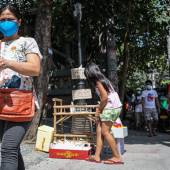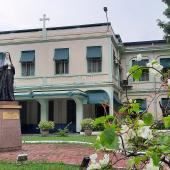Glimmer of hope amid anxiety, fear in central Philippines

Ronald O. Reyes, LiCAS.news
The phone calls came late on Tuesday evening. Each caller sounded the same. Each talked of his or her anxiety, fatigue, and fear.
Janelle Carlos, 28, had to take all the calls even late into the night. “It is about keen listening,” she said.
“No matter how small the talk is or the information, I have to respond so that they’ll know that someone out there is listening,” said the volunteer peer counselor in the city of Tacloban.
The calls kept coming especially after news came out that the number of new coronavirus cases in the central Philippine city kept on increasing.
Janelle said that because many of the callers are front-liners, “I have to affirm to them that they know how the virus contaminates, and I try to keep them calm by stating facts about prevention.”
She said it would be difficult if health workers become paranoid or have anxiety attacks and lose focus.
“They would sometimes belittle themselves, that they cannot handle it anymore,” said Janelle. “I give positive reinforcement and positive moods,” she added.
Her callers usually share about their worries, including the possibility of losing their jobs, being infected, and what would happen to their families if they were to be placed in isolation.
As cases of the new coronavirus disease surged in the central Philippines in the past days, people blamed the government’s programs that allow people to go back home to the provinces.
They said the programs have become a “Trojan horse” that brought the disease to the provinces.
Jerry Yaokasin, vice mayor of Tacloban, appealed to the people not to resort to finger-pointing, blaming, and making excuses.
“Instead, we must pray for those who have been infected with the coronavirus that they may be healed. We also need to support all our frontline health care workers and providers. They are as anxious as we are,” he said.
“Instead of finding faults, we must work toward finding actual solutions. Remember, we are all in this together,” added the vice mayor.
“Let us not be paralyzed by fear and panic,” he said as he called on government leaders and health authorities to stop the “blame game.”
Father Chris Arthur Militante, spokesman of the Archdiocese of Palo, said the Church has been in the frontlines in the “spiritual upliftment” of the people.
“It is what the Church does best,” said the priest, although he said they also help communities through relief programs in parishes.
Following restrictions to the public celebrations of religious activities, Archbishop John Du of Palo called on the faithful not to be tired in praying.
“Experts are doing their part, let us also strive to do our part by being more fervent in faith, steadfast in hope, and overflowing in charity,” said the prelate.
“Let the words of our Lady always inspire for I firmly believe that doing what our Lord tells us to do will afford us a much better tomorrow; something better than our plans,” said Archbishop Du.
He said “significant things” happened in recent months “and these have affected the way we live our life.”
“These have significantly altered the public expression of faith,” he said, adding that restrictions aimed at containing the spread of the new coronavirus disease is “a welcome endeavor.”
While churches have been closed, the faithful continue attendance in liturgical services on various social media platforms.
“We now see an ember that we need to keep burning,” said the prelate.
“Let us fan it with charity and concern for each other; these are concrete expressions of a person who believes in God. Let us convert this ember into a full-blown fire as we go back to celebrate public Masses,” said the Archbishop Du as quarantine restrictions started to ease in recent weeks.
He warned, however, that “fanning too much might put the light to naught.”
“I understand that there is too much excitement as we have been deprived, for a long time, to celebrate public Masses,” he added.
He appealed to the public to “remain calm and become beacons of patience.”
“Take note that the relaxation of some restrictions does not square with the disappearance of the deadly virus,” he said.
“We are just given a little window. With our due cooperation and proper guidance the window shall be converted into doors and the doors into gates,” added the bishop.
Radio Veritas Asia (RVA), a media platform of the Catholic Church, aims to share Christ. RVA started in 1969 as a continental Catholic radio station to serve Asian countries in their respective local language, thus earning the tag “the Voice of Asian Christianity.” Responding to the emerging context, RVA embraced media platforms to connect with the global Asian audience via its 21 language websites and various social media platforms.














